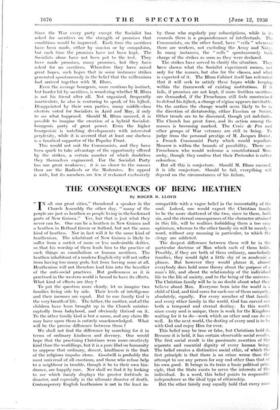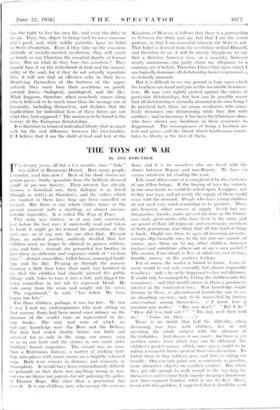THE CONSEQUENCES OF BEING HEATHEN
By ROGER B. LLOYD
" IN all our great cities," thundered a speaker in the Church Assembly the other day, " many of the people are just as heathen as people living in the backward parts of New Guinea." Yes, but that is just what they never can be. One can be a heathen in New Guinea and a heathen in Bethnal Green or Salford, but not the same kind of heathen. Nor in fact will it be the same kind of heathenism. The inhabitant of New Guinea is likely to suffer from a surfeit of more or less undesirable deities, so that his worship of them leads him to the practice of such things as cannibalism or human sacrifices. The heathen inhabitant of a modern English city will not suffer from having too many gods, but from having none at all. Heathenism will not therefore lead him into the beastlier of the anti-social practices. But godlessness as it is practised in the western world is bound to have its effects. What kind of effects are they ?
To put the question more clearly, let us imagine two families living side by side. Their levels of intelligence and their incomes are equal. But to one family God is the very breath of life. The father, the mother, and all the children have been brought up in the Church uninter- ruptedly from babyhood, and obviously thrived on it. To the other family God is but a name, and any claim He may have upon them is entirely unacknowledged. What will be the precise difference between them ?
We shall not find the difference by searching for it in terms of ordinary kindness and decency. One would hope that the practising Christians were more creatively kind than the worldlings, but it is a pure libel on humanity to suppose that ordinary, decent, kindliness is the fruit of the religious impulse alone. Goodwill is probably the most universal of all emotions, and those who refuse help to a neighbour in trouble, though it be to their own hin- drance, arc happily rare. Nor shall we find it by looking to see which family displays the greater fortitude in disaster, and especially in the ultimate disaster of death. Contemporary English heathenism is not in the least in- compatible with a vague belief in the immortality of the soul. Indeed, one would expect the Christian family to be the more shattered of the two, since to them, both sin, and the eternal consequences of the character attained in this life, will be realities forbidding them a too easy optimism, whereas to the other family sin will be merely a word, without any meaning in particular, to which the clergy are addicted.
The deepest difference between them will be in the particular doctrine of Man which each of them holds. Possibly, if they are both of them ordinary, unscholarly families, they would fight a little shy of so academic a phrase. But however they would phrase it, almost everybody does hold some theory about the purpose of a man's life, and about the relationship of the individual life to the life of society, and to the being of the universe. The Christian family will be in no doubt about what they believe about Man. Everyone born into the world is a child of God, and God cares for each one of them uniquely, absolutely, equally. For every member of that family, and every other family in the world, God has carved out both a temporal and eternal destiny. In this world, since every soul is unique, there is work for the Kingdom waiting for it to do—work which no other soul can do as well. In the next world, the destiny of every soul is to be with God and enjoy Him for ever.
This belief may be true or false, but Christians hold it. Because it is held, it has certain observable social results. The first social result is the passionate assertion of the separate and essential dignity of every human being. The belief creates a distinctive social ethic, of which the first principle is that there is no crime worse than the attempt to use any person for any end other than that of his own good. It brings in its train a basic political prin- ciple, that the State exists to serve the interests of the individual. In a word, this belief points to responsible independence as the ideal type of citizenship. But the other family may equally hold that every man has the right to live his own life, and even the duty to do so. They, too, object to being used to serve someone else's good, and, while mildly patriotic, have no belief in State absolutism. Even if they take up the conscious attitude of socially-minded secularism, they will assert as firmly as any Christian the essential dignity of human lives. But on what do they base this assertion ? They cannot base it on the fatherhood of God and the immor- tality of the soul, for if they do not actually repudiate this, it will not find an effective echo in their lives. Depriving themselves of the buttress of the super- natural, they must base their assertions on purely natural. forces—biological, sociological, and the like. What happens, therefore, when somebody comes along who is believed to be much wiser than the average run of humanity, including themselves, and declares that the implications for individual lives of these forces are not what they had supposed ? The answer is to be found in the history of the European dictatorships.
It is therefore in terms of individual liberty that we must seek for the real difference between the two families. If I believe that I am the child of Cod and heir of the Kingdom of Heaven, it follows that there is a partnership as between the State and me, but that I am the senior partner, in that I am immortal whereas the State is not. That belief is derived from the revelation of God Himself, and therefore to me it will be merely blasphemy to say that a dictator, however wise, or a majority, however nearly unanimous, can justly claim my allegiance to a contrary set of beliefs. Therefore I have that upon which I can logically denounce all dictatorship, however persuasive, as eternally immoral.
But it is difficult to see any ground in logic upon which the heathen can stand and join in this invariable denuncia- tion. He may very rightly protest against the crimes of particular dictatorships, but how can he possibly assert that all dictatorship is eternally immoral in its own being Y In practical fact, there are many secularists who cease- lessly denounce one dictatorship while they flirt with another ; and in Germany it has been t he Christians alone who have shown any backbone in their resistance to Juggernaut. The consequences of being a heathen are real and grave, and the threat which heathenism consti- tutes to liberty is the first of them.























































 Previous page
Previous page